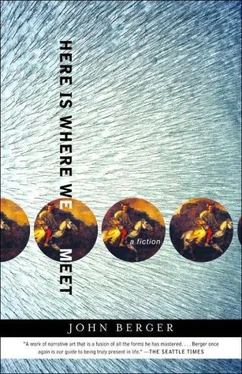By this time we had walked some distance along the path and were high above the Alcântara valley. With a gesture over the parapet he indicated how he hated the idea of being stuck down there with the crowds, the cows, the chatter. And what made it worse was that he was still fit! He asked me my age. I told him. So you understand! he said. Você entende! I understood.
Now he wanted to show me his tunnel. He explained how the two semi-circular ducts for channelling the water were carved by hand out of basalt stone, piece by piece, and how the blocks were fitted together with mortice and tenon joints, and the cracks between the blocks filled with a putty made of quicklime, powdered limestone, and virgin olive oil, and how this putty, once set, was tougher than the basalt stone. Fernando had been trained as a stonemason.
I could not accompany him because of my rendezvous. Nor did I want him to be there when I met my mother. The other times the presence of others hadn’t worried me. Perhaps it was something to do with the location, with being off the ground. Or perhaps because it was the only time my mother had fixed the meeting in advance.
I told him I wanted to draw the view and to draw I needed to be quiet. He nodded, and unlocked a door that led into the tunnel, saying he would leave it open, so that when I was finished I could come and find him.
As he stepped out of the sunlight into the vaulted obscurity, his face relaxed and his eyes opened. The tunnel inside was narrow. I could easily have touched both walls with my outstretched arms. The semi-circular channels on either side were about two hand-spans in diameter. They were less than half-full, yet the flow of the water was even and persistent. After many kilometres, the water had become convinced of the gradient.
Down the centre, above the ducts, ran a flagged walkway, straight as a die, as far as the eye could see. It too was narrow. Two people would have had considerable difficulty in passing on it without one of them stepping off. Fernando switched on his lamp and set out.
A little later, while I was leaning against the parapet opposite the door he had left open, I thought I heard him talking. He was speaking in brief sentences as if making or giving notes. Yet there was nobody with him.
I started walking fast down the outside path, enticed on by the aqueduct’s straightness. All Vieira da Silva’s paintings are, in some way, about Lisboa and its skies and the paths through its skies. When I reached the far side of the valley I turned back and counted the arches until I found the sixteenth, which was not far from Fernando’s open door.
Way below were a couple of unfinished streets and some houses which were being lived in, though still being built. A poor suburb rather than a favela. I could see a car with no wheels, a balcony the size of a kitchen chair, a child’s swing with only one rope attached to a tree, red tiles with concrete blocks on them to prevent them being blown away by the Atlantic winds, a window without a frame with a double mattress hanging out of it, a dog on a chain, barking in the sun.
Do you see? she suddenly said. Everything is broken, slightly broken, like the rejects from the factory they sell cheap, at half price. Not really damaged, only rejects. Everything — the hills, the Sea of Straw, the child’s swing down there, the car, the castle, everything is a reject, and has been so since the beginning.
She was sitting on a portable stool a few metres along the path from me. It was a stool with three legs that folded, which was very light; she used to carry it with her so she could sit down in public places. She was wearing a cloche hat.
Everything begins sour, she said, then goes sweet and is afterwards bitter.
Did Father enjoy his swordfish? I asked.
I’m talking about life, not about details.
In spite of her words she was smiling, even her shoulders were smiling. I remember her smiling like that in a bathing costume on a beach around 1935, because whilst she was wearing the bathing costume she considered herself spared from work.
There was a mistake at the beginning, she continued. Everything began with a death.
I don’t understand.
One day, when you’re in my situation, you will. The Creation began with a death.
Two white butterflies were circling above her hat. Perhaps they had come with her, for there is little on the aqueduct at that height to attract butterflies.
Surely, I asked, the beginning might be thought of as a birth?
That’s the common error, and you fell into the trap as I thought you would!
So, everything began with a death, you say!
Exactly. And the births followed. The births happened — that’s why there’s birth — precisely because they offered a chance of repairing some of what was damaged from the beginning, after the death. That’s why we are here, John. To repair.
Yet you are not really here, are you?
How stupid can you get! We — us — we are all here. Just like you and the living are here. You and us, we are here to repair a little of what was broken. This is why we occurred.
Occurred?
Came to be.
You talk as if nobody can choose anything!
Choose whatever you like. What you can’t do is to hope for everything.
She was still beaming.
Of course.
Hope is a great magnifier — which is why it doesn’t see far ahead.
Why are you smiling?
Let’s hope only for what has some chance of being achieved! Let a few things be repaired. A few is a lot. One thing repaired changes a thousand others.
So?
The dog down there is on too short a chain. Change it, lengthen it. Then he’ll be able to reach the shade, and he’ll lie down and he’ll stop barking. And the silence will remind the mother she wanted a canary in a cage in the kitchen. And when the canary sings, she’ll do more ironing. And the father’s shoulders in a freshly ironed shirt will ache less when he goes to work. And so when he comes home he’ll sometimes joke, like he used to, with his teenage daughter. And the daughter will change her mind and decide, just this once, to bring her lover home one evening. And on another evening, the father will propose to the young man that they go fishing together. . Who in the wide world knows? Just lengthen the chain.
The dog was still barking.
There are certain things which, to be repaired, require nothing short of a revolution, I suggest.
So you say, John.
It’s not a question of my saying, it’s a question of circumstances.
I prefer to believe it’s your saying.
Why?
It’s less evasive. Circumstances! Anything can hide behind that word. I believe in repairs, as I was telling you, and one other thing.
What would that be?
The inevitability of desire. Desire cannot be stopped.
At this point she got up from her portable stool and leant against the parapet.
Desire is unstoppable. The other day I heard one of us explaining why. But I knew it before. Think of a bottomless pit, think of a nothing. An absolute nothing. In it there’s already an appeal — are you following me? A Nothing is an appeal for Something. It can’t be otherwise. Yet the appeal is all there is; there’s only a naked crying-out appeal. A yearning. And so we come to the eternal conundrum of making something out of nothing.
She took a step towards me. She was whispering, with her bathing-costume smile, and her brown eyes fixed on some point in the distance.
The something which is made can give no support to anything else, it is only a desire. It possesses nothing, nothing is given to it, there is no place for it! Yet it exists! It exists. He was a shoemaker, I believe, the man who said all this.
Sounds to me like Jacob Boehme.
Stop dropping names!
She laughed her impertinent seventeen-year-old laugh.
Читать дальше












